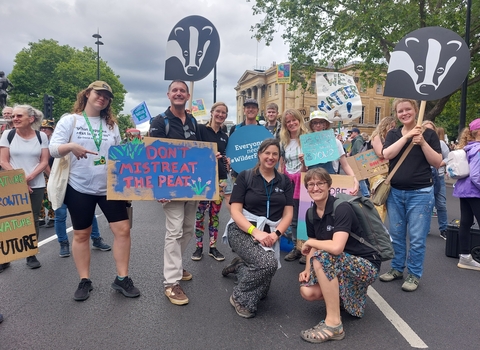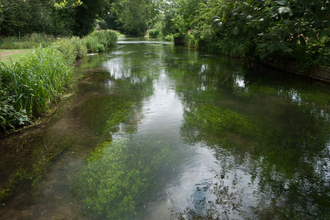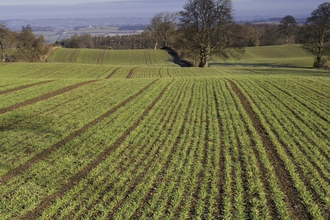
Photo, Ben Hall/2020VISION
How to contact your MP and give wildlife a voice
Speak up for nature
MPs want to hear from their constituents, and it’s a great time to lobby your MP and share how you feel about wildlife and nature in your local area!
We know it can be daunting to meet your MP, or know what to say in a letter/email. Perhaps you've contacted your MP before and not had a reply.
We've got some top tips on how to reach out to your MP below.
Before you contact your MP
Research your MP - find out what they care about, what they did before becoming an MP or what they focused on in the run up to the election. This can help you understand what they think is important.
Work out how you want to contact them - You could write a letter or email, book an in-person meeting (once they have organised an office), or use social media.
Think about what actions you want them to take - To have the biggest impact, consider what actions you think would be achievable for them. This could be work in the local community, or backing important bills in Parliament.
About your MP
Remember that your MP is very busy and many people want to them to listen to their concerns. You will need a friendly, clear and succinct message backed up with reliable and well-researched information.
To be most effective you should aim to have regular contact with your MP and develop a relationship with them over time. It is also worthwhile copying their assistant on any correspondence and/or requests for meetings as they manage their MP’s diary.
What does your MP care about? Using topics your MP already cares about can make it easier to get them to understand and pay attention to what you want to say. You can find this out by researching their background - what did they do before they became an MP? This may give you an insight into what they care about. If the MP is newly elected, you could look at their website or social media - what do they post about? What issues did they talk about during their general election campaign? Some useful links below:
- Local Intelligence Hub - Your staring point for local data about MPs, public opinion and the climate and nature movement in your constituency.
- Vote Climate: Review your MP’s climate voting record.
- TheyWorkForYou: Get detailed information on MPs' voting records, speeches, and more.
How to contact them
There are number of ways you could choose to contact your MP:
- Face to face meeting
- Phone call
- Email or letter
- Using social media
You can write letters to your MP’s local constituency office, or send an email to their constituency email address. To find out who your MP is, and see their contact details, you can use this tool to enter your postcode and see who represents you:
It may take some time for your MP to respond to you, especially as they have recently been elected and may have a lot of people contacting them.
Some MPs might not provide their constituency office address or email. In this case, write to their parliamentary office using their parliamentary email or House of Commons address.
Your MP’s House of Commons address will be:
[MP’s Name]
House of Commons,
London,
SW1A 0AA
Telephone meetings
You can request a telephone meeting by contacting their office. If you telephone without an appointment you might be able to speak to a researcher or a member of their team – this might be an opportunity to pitch your case and answer any questions they may have.
Social media
Most MPs are on Twitter and Facebook. Some MPs will ignore messages on social media but others will engage with you or at least take note of what you are saying. They will take note of what is being said on their social media, especially if lots of their constituents are talking about the same thing. It can also encourage others to take note of what people in their local constituency care about.
You can find the social media accounts of most MPs here.
Letters
Letters can be sent to their constituency address or to parliament (Houses of Parliament, House of Commons, London, SW1A 0AA).
Remember your MP receives thousands of letters and emails. They are more likely to take notice of a short letter that makes the argument clearly and concisely.
- Avoid using acronyms.
- Letters and emails must contain your postal address (so the MP can check you are in their constituency).
- Say who you are and what your concerns are.
- Explain why you are writing and give examples and facts.
- Make your letter or email personal (this will be more effective than using a template provided by an organisation)
- If possible tailor the letter or email to their interests or to how it impacts their constituency (for example, if they are on a committee which addresses your issue, explain why your request relates to their committee’s responsibilities)
- Always ask for a response
- Try to limit yourself to one side of A4 paper
Postcard
Ask your MP to defend nature by sending a postcard that will land on the doormat of their office.
What should you talk to them about?
What do you care about? If you are meeting with your MP in person, it is likely that the meeting will not last very long. If you write to them, your communication may also be more effective if it is succinct. It's important to consider the points that you most want to get across to your MP. Make some notes on what the most important topics for you to discuss are. MPs also love hearing personal stories from the local area, so talk about why your points matter from your own experience.
What action do you want them to take? Many MPs will hear concerns from constituents without a suggestion of what action they want their MP to take. It is important to think about how they can properly address your concern, whether that's in Parliament or within your local area. This means that they can take meaningful action, such as writing to their party leader or backing environmental laws, and you can hold them accountable for these actions too. You may want to use the SMART method:
- Specific - 'Stop climate change' can be difficult to interpret.
- Measurable - Is it something which they can be held accountable?
- Achievable - Your MP is more likely to do small, achievable steps.
- Relevant - Make it local to your area.
- Time-Bound - Ask them when they might be able to do this action.
Here are some things to consider when writing to your MP:
- Remember to add your full postal address, so that the MP can make sure that you are in their constituency.
- Say who you are, clearly explain your concerns and why you are contacting them.
- Provide facts or examples to back up your point.
- Use your personal experience - MPs receive a huge volume of letters and emails, so personalised communication will be more memorable!
- Keep it concise - again, MPs will have to read a lot of letters, so they are more likely to remember information if it is concise.
- Use what the MP cares about to make it personal to them.
- Always ask for a response.
- Ensure you state what action you want to see from them.
These are our top three asks of the incoming government for nature:
What if they don't listen
We know how frustrating and disheartening it is when your MP doesn’t seem to listen, repeatedly sends stock responses, or simply doesn’t respond to you at all. While it can feel futile, it is absolutely vital that constituents continue to make their concerns known to MPs about issues they care strongly about. MPs are publicly elected, and are obligated to listen to you, and respond to your concerns.
If everyone stops contacting their MP because they don’t think they’ll listen, the MP won’t hear the valid concerns of their constituents. They will likely start to feel the issue is no longer facing opposition. It is important to keep up the pressure to make sure an MP knows when they don’t have constituent backing. The more MPs that find themselves in this position, the more likely they are to question the government’s position.
We do see examples where MPs who were strongly opposed to certain developments or issues have done complete u-turns due to consistent engagement from their constituents, sometimes over several years.
At the same time, showing the people around you, in person or on social media, that you oppose an issue and are contacting your MP has a huge impact. Seeing that you’ve contacted your MP often encourages those around you to do the same, feeling encouraged and reassured that they’re not alone.
If you don't want to meet with your MP or if your MP doesn't respond, why not write a letter to the editor of your local newspaper?
Your letter can make an impact in lots of ways:
- letters reach a large audience online and offline
- they will often get noticed by your MP's office
- you can highlight more details or information not addressed in a news article
- letters can help create an impression of widespread support for, or in opposition to, an issue
We have plenty of tips to help you write a letter that speaks up about issues affecting wildlife and the nature crisis, asks questions of those in power, or shows support for a wilder future that everyone can benefit from.
Using our simple form, you will be matched up with your nearest local newspaper Editor, and can send your letter direct.
When you contact your MP
Use your personal experience - When communicating with your MP, you could use a personal experience to explain why you care about what you’re contacting them about.
Give them context - Explain the information behind your reason for contacting them. Has something happened in the news or your community recently that’s relevant? They may not be aware, so it’s good to keep them informed.
Always add your address - Add your full postal address to any communications so the MP can check that you live in their constituency.
Don’t give up - MPs are going to be very busy right now. Don’t be disheartened if they don’t respond right away, and feel free to send them a follow-up if they haven’t responded. It’s important to keep trying!
How to prepare for your meeting
Whether you have arranged a telephone or face to face meeting, plan what you are intending to say and prepare answers to each of the following questions to help you stay focussed.
- Introduce yourself
- What are you going to say? (Include some local context if applicable)
- How are you going to convince them to act?
- What are you going to ask them to do?
- Thank them for listening
Top tips
- If you are worried about meeting your MP, particularly for the first time, consider taking a friend for moral support
- If possible arrive early and get to know the MP’s staff (they can be useful if you are hoping to have future meetings with your MP).
- Explain the issue to your MP and ask them for their opinion about it
- Get them to agree to act – make sure you note down anything they say they will do
- Ask them what you can do to help them: for example, would they like a briefing on the issue?
- Do they have any follow up questions (if you don’t know the answer, say you will get back to them - we are happy to help you via communications@devonwildlifetrust.org)
- If you meet face to face you might want to get a photo with your MP – you can ask a staff member to take it and if you like you could hold up an action card or placard to make it more eye catching.
-
Remember you can use the SMART method when deciding the action you want them to take:
- Specific - 'Stop climate change' can be difficult to interpret
- Measurable - Is it something which they can be held accountable?
- Achievable - Your MP is more likely to do smaller, achievable steps.
- Relevant - Make it local to your area and relevant to their role in Parliament.
- Time-Bound - Ask them when they might be able to do this action.
After your meeting
It’s always good to send your MP an email or letter thanking them for meeting you and reminding them of what they’ve agreed to do. You can also include any further information they asked you for.
Send a report and photo about your meeting to your local paper, if possible with a quote from both you and from your MP.
Share a report of your meeting and photo on social media, stating what your MP has agreed to do and make sure you tag them and tag Devon Wildlife Trust.

Share your story
Val Siddiqui turned her frustration about the state of nature into action by meeting her MP. Read her experience and advice here.
If you contact or meet with your MP, let us know how it went!
Become a member and support our work
The vital work we do for nature depends on the support of people who care about the future of Devon's wildlife and wild places.




